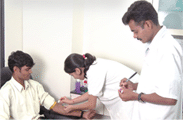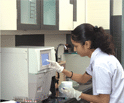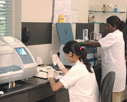Health Issues

What is Cancer?
Cancer is a broad term that encompasses over one hundred different types of cancer. Although each type has its own set of characteristics, there are some cancer symptoms that occur in many types of cancer.It is important to note that some types of cancer do not present any symptoms until they are in advanced stages. This is why cancer screening and risk assessment are vital for cancer prevention and early detection.
What are the symptoms of cancer?
A broad spectrum of non-specific cancer symptoms may include:Persistent Fatigue: Fatigue is one of the most commonly experienced cancer is advanced, but still occurs in the early stages of some cancers. Anemia is commonly the culprita condition that is associated with many types of cancer, especially types affecting the bowel. Fatigue is symptom of both malignant and non-malignant conditions and should be evaluated by a physician.
Unintentional Weight Loss: While it may be a welcome surprise to lose weight without trying, it can be a red flag for many illnesses, including cancer. Losing 10 pounds or more unintentionally definitely warrants a visit to the doctor. This type of weight loss can occur with or without loss of appetite. Remember, weight loss can be a symptom of cancer, but is also a symptom of many other illnesses, too.
Pain: Typically, pain is not an early symptom of cancer, except in some cancer types like those that spread to the bone. Pain generally occurs when cancer spreads and begins to affect other organs and nerves.
Lower pack pain is cancer symptom that is associated with ovarian cancer and colon cancer and colon cancer. Shoulder pain can also be a symptom of lung cancer. Pain in the form of headaches can be associated with brain tumors (malignant and benign.)
Stomach pains can be related to types of cancer, like stomach cancer, pancreatic cancer, and many others. Stomach pain can be a very vague symptom because so many illnesses can cause stomach pain.
Fever: A fever is a very non-specific symptom of many mild to severe conditions, including cancer. In relation to cancer, a fever that is persistent or one that comes and goes frequently can signal stress on the immune system. Fevers are commonly associated with types of cancer that affects the blood, like leukemia and lymphoma but are also common in people whose cancer has spread.
Bowel changes: If you experience constipation, diarrhea, blood in the stools, gas, thinner stools, or just a general overall change in bowel habits, see your doctor. These symptoms are most commonly associated with colon cancer, but are also related to other cancer types.
Chronic Cough: A Persistent, new cough or a cough that wont go away or becomes worse needs to be evaluated by a doctor. Blood & / or mucus may accompany the cough and can be caused many conditions. In relation to cancer, a chronic cough with blood or mucus can be symptom of lung cancer.
Keep in mind that these are very general, vague symptoms of cancer. If you have one or two of these symptoms, it is not a red flag for cancer but more an indication to your doctor to run certain medical tests. The symptoms listed above are experienced by most people with cancer at various stages of their diseases, but are also linked to many other non-cancerous conditions. For more specific cancer symptoms, see below for symptom information about several types of cancer. You may also get a better understanding what your symptoms may mean by using an interactive health education too.
What is ovarian cancer?
Ovarian cancer is a cancer that originates in the ovaries. The ovaries are the part of female reproductive system; located on either side of the uterus in the lower abdomen. The ovaries produce eggs (called ova). They are also the main source of a womans female hormones, estrogen and progesterone.In ovarian cancer, cells begin to grow in an uncontrolled, abnormal manner and produce tumors in one or both ovaries. Many types of tumors can start growing in the ovaries. Some are benign (non-cancerous) and never spread beyond the ovary. Other types of ovarian tumors are malignant (cancerous) and can spread to other parts of the body.
Ovarian cancer can invade, shed, or spread to other organs
Invade: A malignant ovarian tumor can grow and invade organs next to the ovaries
Shed: Cancer cells can shed (break off) from the main ovarian tumor. Shedding into the abdomen may lead to new tumors forming on the surface of nearby organs and tissues
Spread: Cancer cells can spread through the lymphatic system to lymph nodes in the pelvis, abdomen, and chest
Who is at risk for ovarian cancer?
Women with a family history of cancer of the breast, uterus, colon, or rectum Those with personal history of breast, or colorectal cancer
Women having late menopause (after age 50 years)
Older women who have never been pregnant
What are the symptoms associated with ovarian cancer?
Early ovarian cancer may not cause obvious symptoms. But, as the cancer grows, symptoms may include: Pressure or pain in the abdomen, pelvis, back, or legs
A swollen or bloated abdomen
Nausea, indigestion, gas, constipation, or diarrhea
Feeling very tired all the time
Shortness of breath
Feeling the need to urinate often
Unusual vaginal bleeding (heavy periods, or bleeding after menopause)
Weight loss
What are the myths associated with ovarian cancer?
If ovarian cancer does not run in family, one cannot get it Ovarian cancer has no symptoms
Ovarian cancer has no cure
There is nothing that can be done to reduce the risk of ovarian cancer
What are diagnostic tests for ovarian cancer?
CA-125 Antigen testCA-125, cancer antigen-125, is a protein that is found at levels, in most ovarian cancer cells, that are elevated compared to normal cells
WHAT IS CA 125 TEST?
The CA 125 test is blood test that determines the level of an antigen in the blood which is known to be a tumor marker. It is commonly used to monitor the state of the disease in ovarian cancer patients, because 80 90% of women with ovarian cancer in its later stages will have signs of the antigen in their blood.Is CA 125 EVER USED FOR SCREENING AT THIS TIME?
Yes, women known to be at high risk for ovarian cancer are often screened regularly, using a combination of the CA 125 test, transvaginal ultrasound, & rectal/ pelvic examination. If you have reason to think you have a high risk for ovarian cancer, you should ask your doctor about this. The most significant risk factor is having close relatives with histories of ovarian &/ or breast cancer, particularly if they were younger than 50.WHAT ARE THE STATISTICCS OF ITS ACCURACY?
Slightly over80 %of women who have ovarian cancer will have an elevated CA 125 in the liquid portion of their blood serum) at the time of diagnosis.Ca 125 II is a new assay & it is more specific than CA 125.
We recommend that females having symptoms or strong family history should undergo screening test Ca 125 II. For further details kindly contact our lab staff at Shreeji pathology laboratory or contact us on shreejipathlab@gmail.com
Debt Causes Real Physical Health Problems,
21/08/2009 - The stress caused by debt is a major health risk linked to a variety of health problems, according to a recent survey conducted by Associated Press-AOL Health. Scientists have known for a long time that stress can be hard on the body,...
The stress caused by debt is a major health risk linked to a variety of health problems, according to a recent survey conducted by Associated Press-AOL Health.
Scientists have known for a long time that stress can be hard on the body, due to the effects of stress hormones designed to prime the body for "fight or flight." Over the long term, these hormones can hamper everything from digestive, immune and heart health to reproduction, growth and memory.
Antibiotics Cause Health Problems
Over half a million kids in the Inida each year have side effects or bad reactions from common prescription drugs, and five percent of them are hospitalized. Children under five are the most affected and the drugs causing the problems run the gamut, but antibiotics have been found to cause the most problems.
Immediate problems from antibiotics include rashes, stomachaches and diarrhea. But what they're not telling us is: antibiotics don't just cause temporary rashes and stomachaches. They set us up for numerous problems later in life.
The reason that antibiotics cause so many problems is they kill the healthy bacteria in our gut, and our healthy bacteria are needed to protect us from many problems. Once you've destroyed your healthy bacteria with antibiotics, numerous problems can take hold. The most common problem to take hold is Candida overgrowth, and Candida overgrowth can be at the root of numerous health conditions.
Instruments
 Shreeji Pathlab is equipped with the latest hi-tech instruments for giving our patients the best. More>>
Shreeji Pathlab is equipped with the latest hi-tech instruments for giving our patients the best. More>> Tests Done
 The laboratory has provided various body profile
checkups like executive profile, cardiac profile, liver
profile, kidney More>>
The laboratory has provided various body profile
checkups like executive profile, cardiac profile, liver
profile, kidney More>> Seasonal Disease
 Jaundice, also known as icterus, is a condition which is charact erised by a yellowish
discolouration More>>
Jaundice, also known as icterus, is a condition which is charact erised by a yellowish
discolouration More>> 



